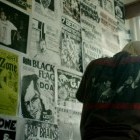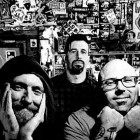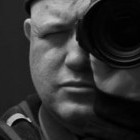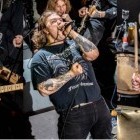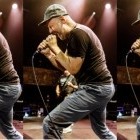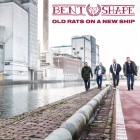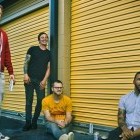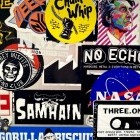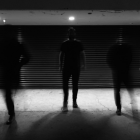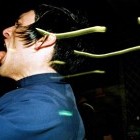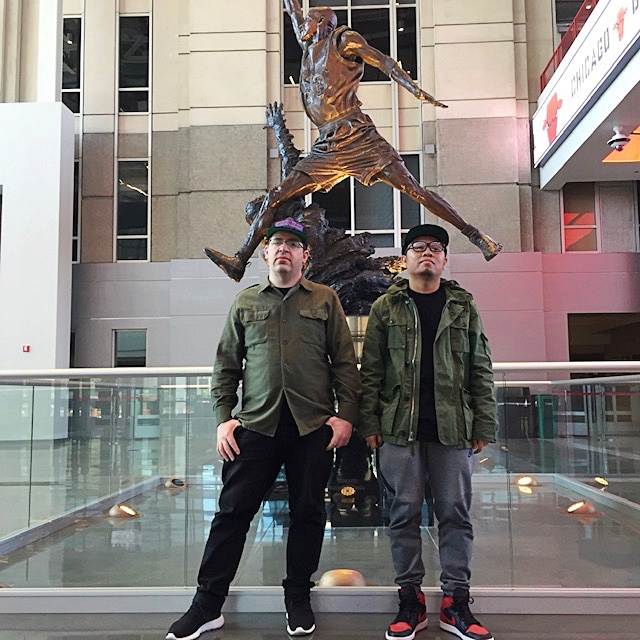
To the naked eye, Al and Mike are normal guys with 9-5 jobs and interests in music, food, and sneakers. However, since starting their podcast, Virtual Pros (named after a wrestling video game series started in 1997), they've become tastemakers in the underground wrestling community. Focusing mainly on vintage and modern Japanese wrestling, Vrtl Pros (this shortened-styled name is how fans have come to know the podcast) is both a super-informed, in-depth look at the world of professional wrestling, and a humorous, inclusive gateway to a subculture which is usually taken way too seriously.
In the three years since its inception, Vrtl Pros have become almost just as well-known for their sought-after merchandise as the podcast itself (their Hayabusa tribute tee with a Juvenile 400 Degreez motif is what first caught my eye). I caught up with Al and Mike to pick their brains and see what makes the best wrestling podcast tick.
A portion of readers may be unfamiliar with professional wrestling's massive underground subculture. Can each of you please give brief overviews of your fandom up until the point of starting the podcast? I feel like that will in turn clue them in.
Al: I've been a lifelong fan. I started off like any other '80s kid being super into Hulk Hogan (I say that but Mike's on record stating that he hates Hulk Hogan). From there, I kinda quit in the mid-'90s when Yokozuna won the title and UFC started making its way into the video stores and I became obsessed with people like Royce Gracie because I too was a fucking twerp, and Keith Hackney because he seemed like the most brutal fighter ever. Everything changed when I got America Online and found all these weird pockets of pro wrestling (specifically Japanese wrestling) and found out that there were other weirdos that actually wanted to chat about it. From there, I was spending my days on AOL's Grandstand and DVDVR trading tapes and shooting the shit.
I had another lapse in fandom when I went to college but got really back into it when Shinsuke Nakamura was on his New Japan run and here we are in my 30s and I'm as deep into it as ever.
Mike: I can't remember a time when wrestling wasn't somewhere in my life. I'm from the northeast so it was mostly WWF growing up, but around age 11 I became one of those weird obsessive kids that would try and find all the wrestling possible on TV and got into anything I could find, WCW, NWA, GWF, UWF, etc. I got out of it around the beginning of high school just because that's the time you wanna be cool and leave the kid shit behind, but then the discovery of ECW brought me back into it, which also led me to seeking out more obscure stuff until I ended up in the sordid world of tape trading. I've had my ins and outs with wrestling since that point, and admittedly I wasn't even the biggest wrestling watcher when VP started, but this project has definitely led me down the path of my early life obsessiveness.
What specifically made you guys want to start Vrtl Pros?
Al: I think Mike said something along the lines about how he wished that he could monetize his pro wrestling knowledge and it kind of just sparked something in my brain one morning so I shot my shot and asked Mike if he'd be down to do a podcast and he obliged. Part of me wonders if he felt guilty about getting into it. I was just looking for a creative outlet to maintain in my spare time.
Mike: I was working mostly freelance at the time doing sleazy social media internet stuff and looking for new and exciting ways to make money. I posted on Facebook asking if any of my wrestling friends could get me an actual paying job maybe writing about it or in the social media field. Al answered my call with the podcast proposal which I wasn't really looking for since I already hosted a podcast but he added the caveat of spinning it off into making shirts/merch which i was already dabbling in at the time and it just seemed to make sense since as unbelievable as it is now, there was a completely open market as far as making Japanese wrestling-inspired and visually wearable shirts. I was immediately hooked on that idea and from there on we unwittingly created a fairly overcrowded niche market. You're welcome everyone!
I didn't listen to the podcast from its inception but at one point I went back and listened to the early episodes and I was surprised to find out that towards the beginning of the show, you both weren't the diehard merch flippers and collectors that you are now. You both actually sort of shunned collecting merchandise, especially wearing pro wrestling tees in public. What sparked that change?
Al: I've always had a collectors mentality whether it be for sneakers, toys, videogames...anything. One day at work, I kinda just cracked the code and found a way to obtain all these incredible vintage Japanese wrestling goods that I never even could have dreamt of having and I was off to the races. I'm kind of scared to count how many t-shirts I've purchased in the past two years but it's a really really irresponsible amount. As I'm typing this now at midnight, I'm haggling with from some woman in Nagoya about a Jushin Liger t-shirt.
Mike: I still have some of my hangups and Al is more into the re-selling stuff. I think every extracurricular thing I've done in my life has the perk of me getting free clothing so I try and keep it under control. Oddly enough, this project doesn't net nearly as much free clothing as I expected. As far as actually wearing the stuff and collecting it, it's a slippery slope just like anything else. The longer you do something, the more people you meet, the more stuff you're exposed to and before you know it, you end up with 3 large storage bins full of shit you never knew you wanted. After going a bit over board for me at least, I'm back to only purchasing the things I absolutely can't live without. I'm still open to free shit though if anyone out there has anything!
Speaking of merchandise, Vrtl Pros merch has become a hot commodity and one of the things that draws people to the podcast. What were you guys trying to achieve with these? Are there any specific guidelines you think you'll stick by moving forward? What can we expect in the future?
Al: A lot of things, but mainly I think both of us just saw an opportunity to differentiate ourselves from the glut of online wrestling projects by designing shirts that someone wouldn't be embarrassed to wear in public. I think my biggest thrill is when someone buys our shirt of a wrestler they're not familiar with, but then takes the time to learn about what we created.
With regards to guidelines, I don't know if I have any. Mike had strong feelings about back prints initially but I think he's warmed up to them. As I get older, I like my clothing a little less loud so maybe you'll be seeing more of these 1 or 2 color tees, but I can guarantee that we'll be dropping another black shirt this year. I really, really want to make an Ebbets Field hat but we'll see.
Mike: It's tough to answer this without spilling too much of the secret sauce. We've spawned a lot of copycats but I don't think many of them have really cracked the code, so I'll be as vague as possible. I think we achieved exactly what we set out to do and then some. I don't think any project I've ever done in my life has worked this smoothly. As far as guidelines, the easiest and most important one is to keep it simple. I'd like to do KISS cards at some point but more seriously I've wanted to do a Kawada shirt for over a year now but the right idea for it hasn't come to me yet. Some day!
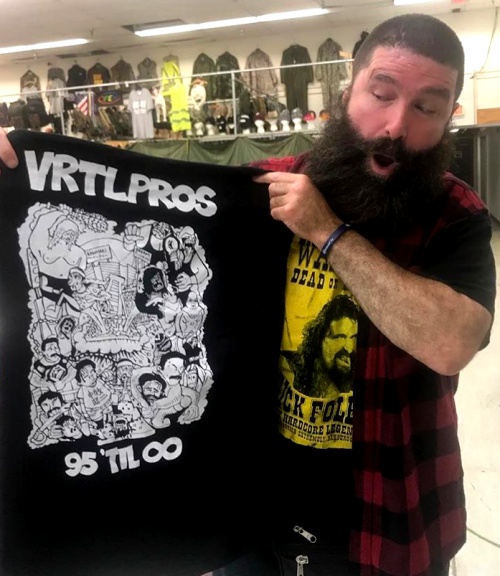
Hip-hop, streetwear, and sneakers are often referenced in the podcast. Is it common for wrestling fans to share these interests these days?
Al: I think wrestling fandom is a little en vogue these days so I've seen more people in public wear their Austin 3:16 shirts with their Adidas NMD's, but I wouldn't say it's common. It's more common for wrestling fans to only like wrestling and wear orthopedic shoes.
Mike: This project has opened my eyes to more of a crossover than I imagined. I think the streetwear culture is more on the surface level with the retro WWF shirts. Once I saw Dej Loaf in the "Try Me" video in the "DX Suck It" jersey I knew it was gonna be a thing. It's just like how kids wear vintage Metallica shirts now and probably have never listened to them before. On the flipside, I'd say the amount of wrestling fans that actually listen to our podcast that fuck with sneakers and streetwear is way more than I would have ever guessed, and by that, I mean more than 5 people.
Mike, you've spent time playing in hardcore bands in the past. There have been so many connections between hardcore/punk and wrestling (Bob Mould of Hüsker Dü writing for WCW, references in all of Tony Erba's bands, etc). What do you think is the common thread between the two cultures?
Mike: There's probably a few, but I'd say the biggest one is once you get involved in punk and hardcore and discover this new and exciting world under the surface that you never knew existed, you start seeking out more fringe culture and I'd consider anything below WWE in the wresting world as fringe culture. One of the blessings this podcast has brought me is that now I go to a ton of wrestling shows which has taken the place of hardcore shows for me which I feel like I'm way too old for. Wrestling shows have been like my retirement plan form hardcore. I can sit back and enjoy other peoples petty clique behavior and weird social politics without actually being a real part of it anymore. It's amazing.
A majority of Vrtl Pros content is Japanese Pro Wrestling (aka "puroresu"). What distinguishes Japanese Puroresu from what non-fans or casual fans think of as wrestling?
Al: I fully admit that this is the dorkiest fucking answer but there's just a stronger importance placed on what happens inside the ring and I feel that Japanese people treat it more as a sport. I think when non-fans think of wrestling in America they envision campy acting and putting people through tables.
Mike: I think mostly that it takes place in Japan. Outside of that, people that only know WWE are conditioned to think of wrestling as long promos, soap opera angles, and very little actual wrestling. Japanese wrestling has elements of that stuff, too, but there's definitely way more of a focus on actual athleticism and putting on a good performance in the ring as opposed to outside of it.
Since sites like YouTube and Dailymotion put an end to the tape trading days, has pretty much everything been digitized or are there still rare gems that only the die hard know of?
Mike: It's just like movies and music. There will always, always, always be stuff that slips through the cracks when the formats change. It's easier to rediscover it than it was back in the tape trading days but there's still a lot of digging to be done. I collected a lot of Michinoku Pro when i tape traded and it's extremely hard to find in streaming form now. There's still people that sell hard to find stuff on DVD, but it's maybe a handful and once those people decide to close shop, it will be even harder. I think the crazy amount of access we have to content now keeps people from really searching for hidden gems, but it's definitely out there.
Al: Shit like mid-'90s Michinoku Pro and BattlArts is impossible to find and gets taken down on YouTube once it gets uploaded. NJWorld is an incredible service but the shitty thing is is that they don't upload full shows from the '90s, so stuff like entrances and transitions are removed, so any time I'm able to come up on full NJPW TV episodes with the wild ass commercials for deodorant and movie trailers I geek out a little. Full All Japan TV episodes exist but there needs to be more.
Is there a specific reason for not having guests or interviews on the podcast? Can we expect guests in the future or are you planning to stick to this formula?
Mike: There's so many reasons why guests and interviews probably won't happen. We do our podcast over the Internet as opposed to recording in real life and full disclosure, every episode we record is a nightmare as far as calls getting dropped, the audio getting wonky, time zone differences, etc., so bringing other people into that is not optimum. Even in a perfect world where that stuff didn't happen, I'm a slight egomaniac and while interviews with notable guests might bring us more exposure, I'd rather people listen to hear us and what we have to say than just tune in because someone they like is on and tune out by the next episode.
Al: I interviewed the director for The Great Sasuke documentary super early on and although I learned some gems and thought it was serviceable, I'm just not that confident in my interview abilities to think that what I'm doing is that engaging for our listening audience. Never say never I guess when it comes to guests, but I don't have anyone in mind currently.

***
You can find an archive of every Virtual Pros episode here. Follow them on Twitter and Instagram.
Tagged: podcast, virtual pros



